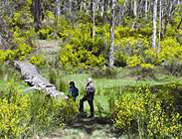Warming could change South Australia's weed pests

(PhysOrg.com) -- Hotter temperatures and reduced rainfall in South Australia due to climate change could prompt a period of 'weed change' across the state, according to a new report from CSIRO.
The report; Climate Change and Invasive Plants in South Australia, used climate projections to 2080 to examine how weeds may shift in range across the State. Detailed profiles are provided for 13 weed species, including options for managing them under climate change.
Lead-author, Dr Darren Kriticos from CSIRO’s Climate Adaptation Flagship, said projections of future climate scenarios indicating higher temperatures and less rainfall on average in South Australia could have a dramatic effect on the distribution and abundance of weeds.
“Existing weed problems in northern areas of the State may shift further south. Landholders may have to deal with species where they have no past experience. In fact, we may be seeing a case of weed change,” Dr Kriticos said.
The report found that by heeding the early warning of projected climatic changes and using possible adaptation options there may be some positive news in terms of strategic weed management.
“As the climate warms the geographic range of some of the weeds that prefer cooler conditions may be reduced. If we can prevent the replacement with other weeds we may be able to put the squeeze on some weeds, particularly the notoriously destructive weeds Bridal Creeper and Scotch Broom,” Dr Kriticos said.
Weeds are a major threat to Australia’s biodiversity and agricultural areas as they out-compete native species and contribute to land degradation. They reduce farm productivity, for example, through injuring animals and contaminating crop harvests. Weeds cost Australia more than A$4 billion a year in control and lost production.
“Being forearmed with this knowledge and sharing information with those who deal with the likely ‘weeds of tomorrow’ will give communities an increased awareness and ability to strategically control potential future problem weeds,” Dr Kriticos said.
The report, produced by CSIRO for the South Australian Department of Water, Land and Biodiversity Conservation, was released today by the South Australian Minister for Environment and Conservation, the Hon Paul Caica MP.
Provided by CSIRO



















